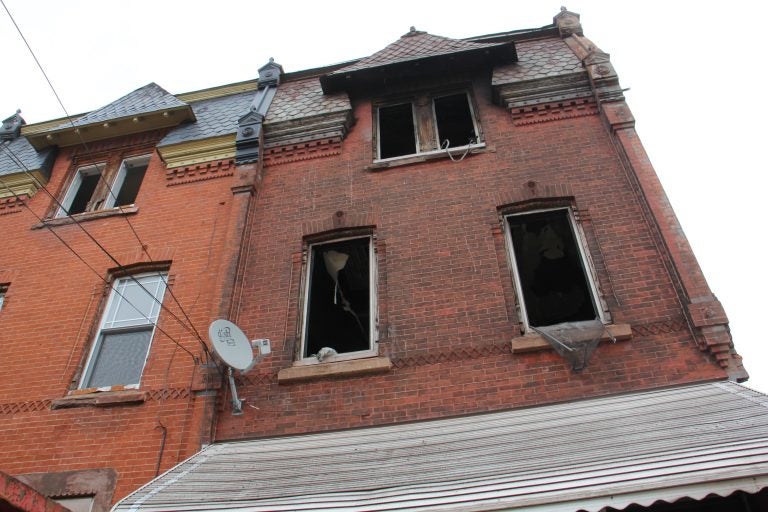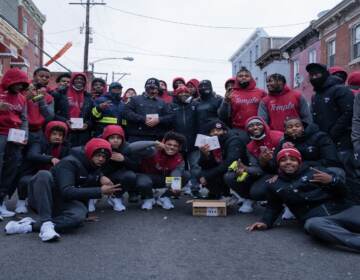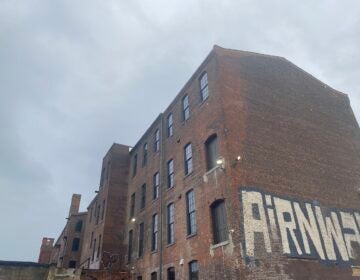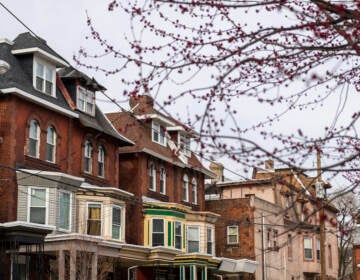After a deadly 2018 house fire, Philly didn’t do much. Will this time be different?
Sometimes disasters lead to change. But in Philadelphia, officials failed to take steps after the last deadly group home fire.

The deadly fire that engulfed 1855 N. 21st St. began on the second floor. (Emma Lee/WHYY)
Shonna Carney remembers exactly how she felt when news about the tragic fire in Fairmount reached her. As a mother of three children who has struggled to find adequate housing, the situation sounded grimly familiar.
“It really made me angry, because of the simple fact that all of those people was living in that building and the smoke detectors didn’t work,” Carney said. “How many people saw that overcrowding, and ya’ll could have helped them move out into their own unit?”
Carney lives in a family member’s subsidized house, after struggling to get a place of her own due to an old eviction on her record. Their home only has five people in it, including an accommodating cousin whose name is on the lease, but she fears what could happen if he decides to have children too.
“You have to pile up in the house with family members and friends and different people, so you end up living in crowded spaces,” Carney said of the struggle to find housing on a limited income in Philadelphia. “It’s all rigged, it’s like you can’t win. It’s a struggle on top of a struggle on top of a struggle.”
Two weeks after the conflagration, the causes of the disaster that took 12 lives are clear. The literal spark was a Christmas tree fire, a too-common occurrence during the holiday season. The larger context, however, was the increasing mismatch between the almost 25% of Philadelphia’s population that lives in poverty and a housing market that cannot adequately meet their needs.
As City Council begins its 2022 session, some residents of the city have called for changes to protect other vulnerable families while others have walked door to door with donated fire alarms and hopes to help prevent the next blaze. Meanwhile, on the first day back in session, Council President Darrell Clarke introduced a minor tax credit for landlords who install fire escape rope ladders. The cash-strapped Philadelphia Housing Authority has suggested that they do not have any immediate plan to change policy course.
Yet sometimes deadly disasters do lead to change.
“There are a lot of really important things to a city that rank ahead of codes and standards until you see a building collapse or fire,” said Karl Fippinger, vice president of government relations for the International Code Council. “We do see on a very regular basis that when people lose their lives [legislative and regulatory change follow].”
Looking back at a recent deadly fire in the city can give some indication of what may come next. In 2018, an illegal rooming house in North Philadelphia burned and four people lost their lives. But the changes policymakers issued in response were largely seen as tepid. Will this time be any different?
“I’m not at all optimistic that something meaningful will be done,” said Jenna Collins, a lawyer with Community Legal Services. “You would think with two fires in such a short period of time, [policymakers] would focus not only on the fire code but meeting issues of low income and affordable housing. But I have no optimism at all.”
How to make homes safer
In 2018, City Council responded to the North Philadelphia fire by requiring legal rooming houses to install tamper-proof hardwired smoke detectors, which would have done nothing for the off-the-books unit that proved so deadly. The Department of Licenses and Inspections (L&I) stepped up activity around illegal rooming houses as well, issuing more cease-and-desist orders to those operating outside the law.
The head of L&I at the time, Dave Perri, wanted to go further. Current Philadelphia law makes it difficult to secure zoning permits to operate rooming houses in much of the city, but that does nothing to create more subsidized housing or reduce the number of tenants in need. To meet the demand, operators simply set up shop in lower income neighborhoods illegally and largely unregulated.
Perri publicly proposed these policy changes without an immediate political sponsor. No one ever visibly backed him up.
“No individual city council person volunteered to take up the cause and expand rooming houses in their district,” said Perri, who retired in 2020. “No one came out and said so, but my sense is they did not want to deal with the backlash that might occur by allowing more transient occupancies in largely owner-occupied situations.”
In retirement, Perri has also been following news about the Fairmount fire avidly and coming up with ideas for how best to respond.
He still thinks the city should move forward with rooming house reform as part of a larger push to better regulate and monitor market rate affordable housing in the city. But the Fairmount fire, and the even deadlier blaze in the Bronx a few days later, raise other necessary reforms he says.
These range from new infrastructure requirements to minor, difficult-to-enforce ideas like banning cut trees, meaning natural Christmas trees, from duplexes (The artificial variety would still be allowed.) Cut trees are already restricted from all but one and two family dwellings in Philadelphia, but given how insanely flammable they are, Perri believes they should be limited to single family homes.
“If you tried to ban them from a single-family dwelling, you’d end up creating a culture war,” Perri said. “But when you have a two family situation, someone’s living above you [Philly duplexes are mostly stacked not side-to-side]. There’s a societal obligation to protect that other family.”
Perri also wants to see hard-wired smoke alarms replace battery-operated systems in all types of housing. Normal detectors are too sensitive, prone to false alerts, and resident tampering. In the Fairmount house, when the housing authority inspected the unit last year the alarms were all functioning. When the blaze occurred, most no longer were. To forestall other such tragedies Perri says PHA, in particular, should install hard wired units in the “scatter site” dwellings it owns around the city.
The home in Fairmount had no fire escape, a fact frequently noted in early reports about the fire. But Perri says that instead of focusing on this kind of infrastructure, which is difficult to maintain, he wants to see retroactive sprinkler installations in duplexes and multifamily buildings over two stories in height when they change tenancy (or after seven years). The law right now requires only new housing to include sprinklers
In response to the Bronx fire, Perri suggests sprinkler installation in the corridors of high rise dwellings. Putting fire suppression systems only in the hallways would keep a blaze from spreading without forcing renters out of their units for the construction period.
“Sprinkler systems are truly the only way of stopping the fire and making sure that folks can get out of the building alive,” Perri said. “If you’re going to spend on a fire escape, you’re much better off taking that money and putting it into a fire suppression system.”
Tenant advocates agree that such changes would be a good idea, but that without more funding for L&I they will go unenforced. A recent study from Pew Charitable Trusts found that because Philadelphia has no program to ensure regular inspections of rental units. Only 7% of the stock is investigated every year. The authors estimated that 45% of the rental housing stock in the city was operating without a license in 2020.
“A lot of times, when it comes to the property maintenance code, it just doesn’t get done,” Collins said. “We’ve seen that getting inspectors to come out, even when complaints are made, takes a lot of time and sometimes several calls. More funding for more robust oversight could make some difference.”
The Pew study noted that L&I’s former planning director estimated in 2017 that $17 million in additional funding would be needed to hire 260 more inspectors to inspect every rental property annually. Some $3.4 million a year would be needed to hire 52 inspectors to do the round once every five years. But even that relatively small allocation could be difficult in a pandemic-constrained budget environment, where service cuts are expected.
‘A matter of political will’
Landlord groups say they are open to conversation around legislation in response to the fire, but warn against requirements that could drive up housing costs.
”The more you add regulations [that’s] also an added cost to a landlord that … potentially gets put onto a future resident or tenant,” said Andre Del Valle, director of government affairs at the Pennsylvania Apartment Association. His group is willing to look at the costs of hardwired smoke alarms and automated sprinkler systems, he noted.
The price of such reforms is real and would need to be addressed unless a purely punitive system is to be put in place. Perri suggested a policy that would mandate a sprinkler system or hardwired smoke detectors in exchange for accessing a tax benefit, like the city’s property tax abatement. No fire suppression system, no tax benefit. Already if an owner is doing a gut job, sprinkler system installation is required in multi-family units. There could be a lower threshold for that requirement.
There is also legislation at the federal level that would encourage better fire protection in rental housing. President Joe Biden’s Build Back Better bill includes $65 billion for public housing rehabilitation, which would go a long way towards addressing the vast capital repair backlogs of the Philadelphia Housing Authority.
The bill also includes $25 billion for Section 8 vouchers, which would allow tenants in overcrowded units a better shot of moving into their own dwellings, and $2.75 billion in federal grants for fire and life safety upgrades. There is smaller legislation in Congress too, like the High-Rise Fire Sprinkler Incentive Act, to amend the tax code to help apartment owners with older buildings afford sprinkler installations.
The need for affordable housing in Philadelphia is so vast that the resources available to the city government and the housing authority have never been remotely able to meet the need. While debates have raged over inclusionary zoning and the city’s highly successful rental aid program, the fact is that only a small fraction of those who need help ever get it.
Until and unless the federal government acts, it is up to state and local authorities to change what they can. They may not have many billions of dollars at their command, but they do control the occupancy, zoning, building, and fire codes.
“The path forward and the answers are readily available in today’s modern codes,” said Fippinger of the ICC. “It really boils down to a matter of political will and dollars to spend. We know the answer on how to avoid these types of tragedies.”
 WHYY is one of over 20 news organizations producing Broke in Philly, a collaborative reporting project on solutions to poverty and the city’s push towards economic justice. Follow us at @BrokeInPhilly.
WHYY is one of over 20 news organizations producing Broke in Philly, a collaborative reporting project on solutions to poverty and the city’s push towards economic justice. Follow us at @BrokeInPhilly.

Subscribe to PlanPhilly
WHYY is your source for fact-based, in-depth journalism and information. As a nonprofit organization, we rely on financial support from readers like you. Please give today.








